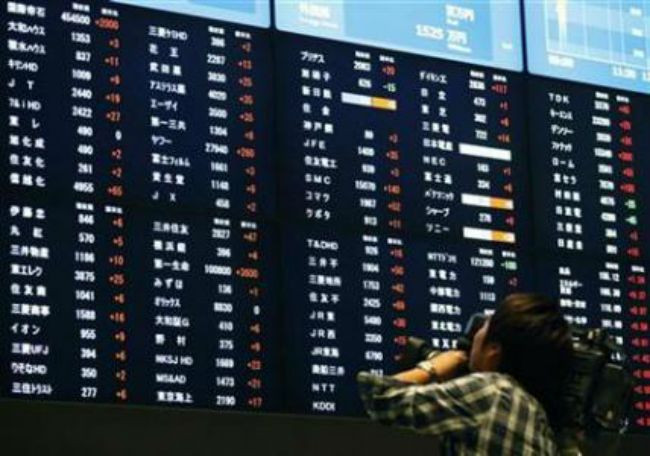
World shares hit 17-month highs and the euro surged on Wednesday as hopes grew for a year-end budget deal in the United States and for further monetary stimulus from the Bank of Japan.
A key business survey in Germany added to the improving sentiment among investors by suggesting that Europe's biggest economy was likely to bounce back quickly from its slowdown.
The growing confidence in the outlook lifted the euro to a 16-month high against the yen and an 8-1/2 month peak versus the dollar. While the FTSEurofirst 300 index .FTEU3 of top company shares scaled fresh 18-month highs. {.EU]
U.S. stock index futures also signaled a third day of gains for the widely watched S&P 500 index .SPX with technology shares in focus after strong results from Oracle. (ORCL.O)
"Continuing loose monetary policy from the major central banks and apparent progress in overcoming the (euro zone) debt crisis has prompted a significant improvement in sentiment," said Bernd Hartmann, head of investment research at VP Bank.
The better tone is being supported by the U.S. Federal Reserve's efforts to boost the recovery in the world's largest economy, signs of growing momentum in China and talk that Japan is set for a policy shift to lift itself out of recession.
The latest German Ifo Institute survey of 7,000 firms bolstered this sentiment by finding that business confidence had improved for a second month running in December, in part because of better export prospects.
The brighter outlook has been behind the solid gains in the MSCI world equity index .MIWD00000PUS, which has taken it to levels not seen since July 2011. The index rose 0.5 percent on Wednesday, on track for its fifth straight weekly gain.
In Europe London's FTSE 100 .FTSE, Frankfurt's DAX .GDAXI and France's CAC-40 .FHCI indexes rose by up to 0.5 percent. .L
Earlier, widespread expectations the Bank of Japan will expand its current asset-buying program at the end of a two-day policy meeting on Thursday had sent Tokyo's Nikkei index .N225 up 2.4 percent and through the 10,000 point level for the first time since April.
FISCAL FEARS
The biggest threat to the current rally remains a fear that U.S. lawmakers would not agree a deal to avoid mandatory tax increases and spending cuts before a year-end deadline. The risk appears to be receding after both sides made compromises in recent days but it has not entirely disappeared.
"Unless they actually come up with a proper decision in relation to the deficit you are going to see ratings agencies come in and that is when you will see a selloff in equities," said Brenda Kelly, market strategist at IG Index.
Underlining that view, ratings agency Fitch warned there was an increased likelihood it would strip the U.S. government of its triple-A credit status if no deal is reached.
Should U.S. policymakers reach a compromise then strategists say currencies that tend to gain on a better global growth outlook - like the euro and Australian dollar - would benefit.
The euro rose 0.6 percent to 112.13 yen, its highest since August 2011, while against the dollar, the single currency reached $1.33, a level not seen since April 2011.
The dollar index .DXY fell to a two-month low of 79.04.
In the bond markets the optimism surrounding U.S. budget talks kept safe-haven debt under pressure with German government 10-year yields rising 4 basis points to 1.45 percent.
U.S. Treasuries did inch a little higher, but this came after a major selloff on Tuesday that sent benchmark yields to their highest level since October.
However, the outlook is not universally bright; Bank of England policymakers, in the minutes of their latest policy meeting, warned that Britain's economy is likely to remain stagnant next year. They also pointed to further risks to the inflation outlook from higher food prices.
There was little market reaction to the release.
Oil markets echoed the rally in equities with Brent crude rising about $1 a barrel to be at $109.90 and U.S. crude gaining 58 cents to $88.35 a barrel.
Copper dipped about 0.5 percent to $7,983.50 a metric ton (1.1023 tons). It has rallied almost 8 percent from mid-November and hit a two-month high a week ago, but has since lost some ground.
Gold added 0.1 percent to around $1,670 an ounce, after falling to $1,661.01 on Tuesday, its lowest since August.
© Thomson Reuters.




